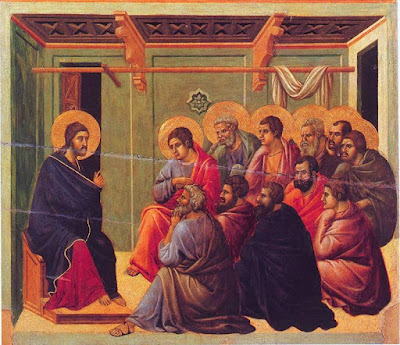But the pope had other ideas. The pope been a young monk under Augustine; but now that young monk was Pope Gregory, known to history as St. Gregory the Great. We all know the story of how Gregory had seen some fair-skinned people being sold as slaves, and when he asked about them, he was told they were Angles. “Not Angles, but angels!” he had responded, and he decided he needed to send missionaries to their people to bring them the knowledge of the Gospel.
England had once known the faith, but the Angles and the Saxons had conquered the land, and had driven the Christians out. Now the time had come to re-evangelize, and Gregory chose Augustine and thirty monks to make the unexpected and dangerous trip to England. Augustine and his monks had the task of finding what few Christians there were, and to bring them back into the fullness of the Church, and also to convince their warring conquerors to become Christians themselves.
Every step of the way Augustine and his monks heard the horror stories of the cruelty and barbarity of the Anglo-Saxons. By the time they had reached France the stories became so frightening that the monks turned back to Rome. Gregory had heard encouraging news that England was far more ready for Christianity than the stories would indicate, including the marriage of King Ethelbert of Kent to a Christian princess, Bertha. He sent Augustine and the monks on their way again, fortified with his belief that the time was ripe for evangelization.
King Ethelbert was a good king and he was curious about his wife’s religion, so he went to hear what the missionaries had to say after they landed in England. Apparently he was just as afraid of them as they were of him! He was afraid that these missionaries would use magic on them, so he held the meeting in the open air. But he listened to what they had to say about Christianity. The king was baptized in 597, and unlike other kings who forced all subjects to be baptized as soon as they were converted, Ethelbert left religion to be a free choice. Nonetheless, during the following year many of his subjects were baptized.
Augustine was consecrated bishop for the English and more missionaries arrived from Rome to help with the new task. Augustine had to be very careful because although the English had embraced the new religion, they still respected the old pagan ways. St. Gregory the Great was very wise, and he urged Augustine not simply to destroy the things of the old pagan religion, but to consecrate the pagan temples for Christian worship and pagan festivals were transformed into feast days of martyrs. Canterbury itself was built on the site of an ancient church which had been built during the earlier days of Christianity.
St. Augustine was in England for only eight years before he died in 605, but he planted the seeds for the growth of the Christian faith in what had been a dark pagan land.
O God, who by the preaching and miracles of blessed Augustine thy Confessor and Bishop, hast enlightened the English people with the light of the true faith: mercifully grant that by his intercession the hearts of them that have gone astray may return to the unity of thy truth; through Jesus Christ thy Son our Lord, who liveth and reigneth with thee, in the unity of the Holy Spirit, ever one God, world without end. Amen.
_______________________________
Image: St. Augustine,
detail from an opus sectile work
in Westminster Cathedral, London.









.jpg)


_-_Nationalmuseum_-_18677.tif.jpg)



